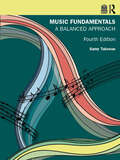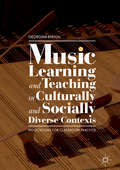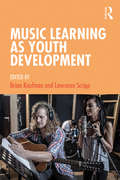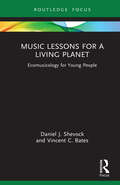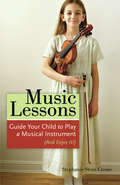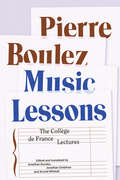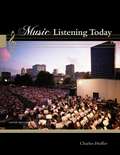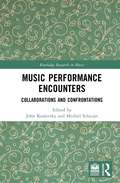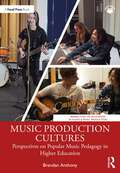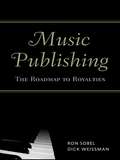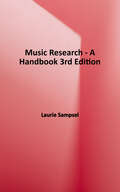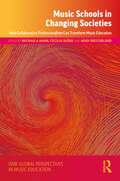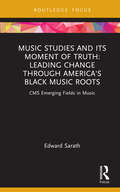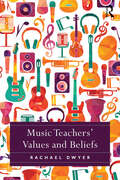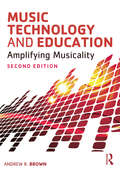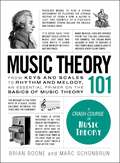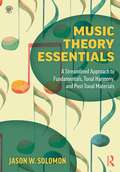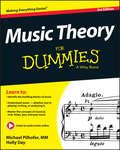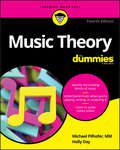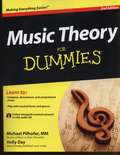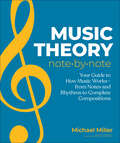- Table View
- List View
Music Fundamentals: A Balanced Approach
by Sumy TakesueMusic Fundamentals: A Balanced Approach, Fourth Edition combines a textbook and integrated workbook with an interactive website for those who want to learn the basics of reading music. Intended for students with little or no prior knowledge of music theory, it offers a patient approach to understanding and mastering the building blocks of musical practice and structure. Musical examples range from Elvis Presley songs to Filipino ballads to Beethoven symphonies, offering a balanced mixture of global, classical, and popular music.The new edition includes: New cultural, historical, and vocabulary references New singing exercises with audio recordings New and updated musical examples with audio recordings throughout Revised counting method for compound meter (“1 la le 2 la le” in addition to “1 2 3 4 5 6”) An enhanced e-book edition with integrated audio for musical examples and direct links to online exercises The author’s balanced approach to beginning music theory engages student interest while demonstrating how music theory concepts apply not only to the Western classical canon but also to popular and world music. With the beginner student in mind, Music Fundamentals: A Balanced Approach, Fourth Edition is a comprehensive text for understanding the foundations of music theory.
Music Learning and Teaching in Culturally and Socially Diverse Contexts: Implications for Classroom Practice
by Georgina BartonThis book examines the inter-relationship between music learning and teaching, and culture and society: a relationship that is crucial to comprehend in today’s classrooms. The author presents case studies from diverse music learning and teaching contexts – including South India and Australia and online learning environments – to compare the modes of transmission teachers use to share their music knowledge and skills. It is imperative to understand the ways in which culture and society can in fact influence music teachers’ beliefs and experiences: and in understanding, there is potential to improve intercultural approaches to music education more generally. In increasingly diverse schools, the author highlights the need for culturally appropriate approaches to music planning, assessment and curricula. Thus, music teachers and learners will be able to understand the diversity of music education, and be encouraged to embrace a variety of methods and approaches in their own teaching. This inspiring book will be of interest and value to all those involved in teaching and learning music in various contexts.
Music Learning as Youth Development
by Brian Kaufman Lawrence ScrippMusic Learning as Youth Development explores how music education programs can contribute to young people’s social, emotional, cognitive, and artistic capacities in the context of life-long musical development. International scholars argue that MLYD programs should focus in particular on the curiosity, energy and views of young people affecting the teachers, musicians, pedagogy, programs, and music with which young people interact. From fields of progressive music education, authors share their perspectives on approaches that can lead to new ways of enabling youth learners as they transition to adulthood. A vast range of possible outcomes arising from in-school, afterschool, and community-based music programs are examined in order to highlight the aspects of youth development that music learning is particularly well-suited to support. Following an introductory essay that provides new perspectives on pursuing lifelong musical development, the volume is features two primary sections. The first focuses on case studies exploring several programs through the lens of the transitional stages of music learning as youth development, helping the reader understand key concepts and explore challenges for creating music learning as youth development programs. The second section addresses the broad implications and policy issues of programs described, including discussing why music learning should be conceived of as critical to formative stages of youth development that can lead to a productive and fulfilling life. The conclusion synthesizes the range of perspectives provided by eight contributors and offers implications for life-long human development through music in the 21st century.
Music Lessons for a Living Planet: Ecomusicology for Young People (Routledge New Directions in Music Education Series)
by Daniel J. Shevock Vincent C. BatesThis volume shows music educators how music teaching and learning can help address humanity’s greatest challenge—the ecological crisis. It provides the essential background knowledge in ecomusicology, from compositions about nature, soundscape experiences, activist songs, to practical lesson ideas.Motivated by the urgent need for increased ecological awareness and sustainable practices, and the ecological aspects of music and musical aspects of ecosystems, the book explores the powerful role that music educators can play in protecting and preserving the natural environment. Each chapter includes a narrative and potential lesson ideas that include listening, singing, playing instruments, moving, and contextualizing, with the goal of translating research in ecomusicological theory into a sustainable, creative, and critical music teaching practice.Bridging the gap between recent scholarship and pedagogical work, this book will be a valuable resource for educators, P–12 classroom teachers, and music specialists, as well as in undergraduate music education methods courses.
Music Lessons: Guide Your Child to Play a Musical Instrument (and Enjoy It!)
by Stephanie Stein CreaseProviding guidance for parents who want their children to enjoy learning to play a musical instrument, this resource teaches parents the best ways to encourage children's musical talents. Key guidance is provided for the trickiest hurdles of all: helping children learn how to practice and navigating their impulse to quit by encouraging them to take pride in their progress despite the frustrations of the learning process. Commonly taught methods--including Suzuki, Kodaly, Dalcroze training, and the Orff approach--and instrument selection are discussed in detail, as are tips for choosing the right teacher. Up-to-date resources and references for youth orchestras, national and regional organizations, outreach programs, and school advocacy organizations, and supplementary materials for various ages and stages of ability, are provided.
Music Lessons: The Collège de France Lectures
by Pierre BoulezThe eminent French composer’s groundbreaking lectures, available for the first time in English: “a major event” (Alex Ross).Music Lessons collects the yearly lectures of French composer Pierre Boulez, prepared for the Collège de France between 1976 and 1995. These lectures offer a sustained intellectual engagement with themes of creativity in music by a widely influential cultural figure, who has long been central to the conversation around contemporary music. In his essays Boulez explores the process through which a musical idea is realized in a full-fledged composition; the complementary roles of craft and inspiration; the degree to which the memory of other musical works can influence and change the act of creation; and other deeply fascinating topics. Boulez also gives a penetrating account of problems in classical music that are still present today, such as the crippling conservatism of many musical institutions. Woven into the discussion are stories of Boulez’s own compositions and those of fellow composers whose work he championed, as both a critic and conductor: from Stravinsky to Stockhausen and Varèse, from Bartók to Berg, Debussy to Mahler and Wagner, and all the way back to Bach.This edition includes a foreword by Jean-Jacques Nattiez and a preface by Jonathan Goldman.
Music Listening Today
by Charles HofferCharles Hoffer's best-selling MUSIC LISTENING TODAY is a complete course solution that develops student's listening skills while teaching them to appreciate the different styles, forms, and genres of music. The text provides dozens of familiar and lesser-known musical selections, all carefully chosen for their ability to get students interested in listening to all kinds of music.
Music Mind and Education
by Keith SwanwickExplores the psychological and sociological dimensions of musical experience and their implications for music teachers. this significant book should be in the hands of all with an interest in music education' - "TES" This title available in eBook format. Click here for more information. Visit our ebookstore at: www. ebookstore. tandf. co. uk.
Music Performance Encounters: Collaborations and Confrontations (Routledge Research in Music)
by Michiel SchuijerWhy do most musical performers and musical researchers continue to inhabit divergent epistemic spaces? To what extent is the act of musical performance coextensive with the act of doing musical research, and vice versa? At what point in the research process can a performative act transform into a scholarly one, and a scholarly act into a performative one? These, and other related questions, form the central focus of this book, with each chapter offering a fresh perspective on a particular topic in music performance studies: improvisational traditions, historical performance practices, analysis and performance, sports psychology, cross-cultural musical interactions, and institutional challenges. This book is aimed at music researchers, teachers, students, and practising musicians interested in the intersection of academic and performance research; as such, it seeks to bridge the divide between the research of university-trained musicologists, scholars from other fields who focus on music, and the growing community of musical artist-researchers. Material in this book is supported by performance outcomes offered by the contributors on a separate YouTube channel and on the Routledge online portal.
Music Play: The Early Childhood Music Curriculum Guide for Parents, Teachers and Caregivers
by Alison M. Reynolds Wendy H. Valerio Beth M. Bolton Cynthia C. Taggart Edwin E. GordonChildren are naturally fascinated with sound and movement play as they teach themselves how to function in the world. Every child has the potential to learn music. Without early, sequential music development guidance, however, the potential for true music understanding and enjoyment is left underdeveloped among most children. <p><p> This music series, based on A Music Learning Theory for Newborn and Young Children and years of practical and experimental research, is designed to assist teachers, parents, and caregivers of newborn and young children in the development of basic music skills such as singing, rhythm chanting, and moving. By using this compilation of music and movement activities you will discover the pure delight of playing music and movement games with children. <p><p> You will learn how to provide a rich music environment for them, how to listen and understand the sounds they make, and how to reinforce each child's music and movement creativity through imitation and improvisation using audiation, the ability each of us has to think music.
Music Production Cultures: Perspectives on Popular Music Pedagogy in Higher Education (Perspectives on Education in Audio & Music Production)
by Brendan AnthonyMusic Production Cultures draws on interviews with international educators, surveys completed by students of music production from around the globe, doctoral research findings and contextualised career experiences from the author as a celebrated music producer to explore how effective learning environments can be created for popular music production in higher education. Acknowledging the musical, technological and social diversity in global popular music production practice, this book highlights the integral elements that educators and their institutions must consider in order to provide high-quality and relevant education for the students of today and into the future. Offering concepts, approaches and practices to be integrated into diverse music production pedagogical frameworks in higher education, this book considers the pedagogical approaches and goals that bridge music production education to the industry, using examples and insights from international educators throughout as well as lesson plan examples for instructors. Music Production Cultures develops a foundation of practice to inform teachers designing equitable, diverse and inclusive pedagogies that are dependent on the musical, cultural and social influences of their students. This is an invaluable resource for educators and researchers in the area of audio education looking to develop their pedagogical strategies.
Music Publishing: The Roadmap to Royalties
by Dick Weissman Ron SobelMusic Publishing covers the basics of how a composition is copyrighted, published, and promoted. Publishing in the music business goes far beyond the physical sheet--it includes live performance and mechanical (recording) rights, and income streams from licensing deals of various kinds. A single song can generate over thirty different royalty streams, and a writer must know how these royalties are calculated and who controls the flow of the money. Taking a practical approach, the authors -- one a successful music publisher and attorney, the other a songwriter and music business professor -- explain in simple terms the basic concept of copyright law as it pertains to compositions. Throughout, they give practical examples from "real world" situations that illuminate both potential pitfalls and possible upsides for the working composers.
Music Research: A Handbook , Third Edition
by Laurie SampselConcise and practical, Music Research introduces students to the major print and electronic research tools available to them. This unique handbook does not aim to provide an exhaustive introduction to the subject; rather, it is highly selective and guides students to the most significant English-language research tools and resources, reference titles in major areas, and principal sources in French, German, Italian, and Spanish. Now updated to reflect the growing emphasis on the digital humanities, this is the perfect guide for 21st century music scholars. The text is supplemented by a comprehensive Companion Website that includes supplement links, updates to available bibliographies and readings by chapter, research tools listed by composer, and lists of core music journals and major professional music associations.
Music Schools in Changing Societies: How Collaborative Professionalism Can Transform Music Education (ISME Series in Music Education)
by Michaela Hahn, Cecilia Björk, and Heidi WesterlundMusic Schools in Changing Societies addresses the need to understand instrumental and vocal pedagogy beyond the individual sphere of teacher–student interactions and psychological phenomena, focusing instead on the wider sociocultural, spatial, and institutional contexts of music education. Viewing music education through the perspective of collaboration, the book focuses on the context of European music schools, which have developed a central role in publicly funded educational and cultural systems. The authors demonstrate that multilevel collaboration is a vital part of how music educators and the schools where they work can respond to wider societal concerns in ways that improve educational quality. Presenting examples of innovative practices and collaborative settings from twelve European countries, this book offers new and inspiring perspectives on how music schools can support the transformation towards collaborative professionalism in instrumental and vocal music education. With contributions from a wide range of researchers and professional educators, the book shows how a collaborative approach to music education can address major policy issues such as inclusion, democracy, and sustainability. Addressing current institutional and curricular challenges, Music Schools in Changing Societies presents a unique outlook on how music schools in contemporary societies can survive and thrive in times of change.
Music Since 1900: Performance Practice in the Music of Steve Reich
by Russell HartenbergerPerformance Practice in the Music of Steve Reich provides a performer's perspective on Steve Reich's compositions from his iconic minimalist work, Drumming, to his masterpiece, Music for 18 Musicians. It addresses performance issues encountered by the musicians in Reich's original ensemble and the techniques they developed to bring his compositions to life. Drawing comparisons with West African drumming and other non-Western music, the book highlights ideas that are helpful in the understanding and performance of rhythm in all pulse-based music. Through conversations and interviews with the author, Reich discusses his percussion background and his thoughts about rhythm in relation to the music of Ghana, Bali, India, and jazz. He explains how he used rhythm in his early compositions, the time feel he wants in his music, the kind of performer who seems to be drawn to his music, and the way perceptual and metrical ambiguity create interest in repetitive music.
Music Studies and Its Moment of Truth: CMS Emerging Fields in Music (CMS Emerging Fields in Music)
by Edward SarathMusic Studies and Its Moment of Truth: Leading Change through America’s Black Music Roots presents a new framework for racial justice discourse in the context of music studies and education. Centering on Black American Music, the book issues challenges to both the conventional music studies paradigm and decades-old reform efforts. While Black American Music ranks high among America’s contributions to world culture, and offers musicians powerful tools for musical practice and understanding, this musical legacy remains remarkably marginalized even in activist conversations. The author argues that this reflects lingering and unexamined racist patterns that persist even among the most fervent voices for anti-racist interventions, and addresses the need for a higher-order activist framework within music studies. Delving further into the transformative changes needed to pursue racial justice, the short pieces collected in this book discuss topics including a shift from multicultural ideology to a transcultural model of musical pluralism, analysis of the multi-tiered nature of musical racism, the whitewashing of music studies activism, K-12 music teacher education as the locus for paradigmatic change and the potential for a transformed model of music studies to catalyze an overarching revolution in creativity and consciousness in both education and society at large. Critiquing the failures of progressive reform efforts and conventional reaction, this book argues that major changes are needed to the discourse on racism in music studies, and envisions new paradigms for the future.
Music Studies and Its Moment of Truth: CMS Emerging Fields in Music (CMS Emerging Fields in Music)
by Edward SarathMusic Studies and Its Moment of Truth: Leading Change through America’s Black Music Roots presents a new framework for racial justice discourse in the context of music studies and education. Centering on Black American Music, the book issues challenges to both the conventional music studies paradigm and decades-old reform efforts.While Black American Music ranks high among America’s contributions to world culture, and offers musicians powerful tools for musical practice and understanding, this musical legacy remains remarkably marginalized even in activist conversations. The author argues that this reflects lingering and unexamined racist patterns that persist even among the most fervent voices for anti-racist interventions, and addresses the need for a higher-order activist framework within music studies.Delving further into the transformative changes needed to pursue racial justice, the short pieces collected in this book discuss topics including a shift from multicultural ideology to a transcultural model of musical pluralism, analysis of the multi-tiered nature of musical racism, the whitewashing of music studies activism, K-12 music teacher education as the locus for paradigmatic change and the potential for a transformed model of music studies to catalyze an overarching revolution in creativity and consciousness in both education and society at large. Critiquing the failures of progressive reform efforts and conventional reaction, this book argues that major changes are needed to the discourse on racism in music studies, and envisions new paradigms for the future.
Music Teachers' Values and Beliefs
by Rachael DwyerIn Music Teachers' Values and Beliefs, Dwyer investigates the relationships between teachers, learners and music in music classrooms. Using Bourdieu's concepts of habitus and doxa as an interpretive lens, the book explores the values and beliefs of four music teachers, depicted in richly detailed narratives. The narratives are contextualised through the examination of traditions of music and contemporary approaches. In the past, music education has been shaped by elitist tendencies regarding the types of music worthy of study, the ways in which music should be learnt, and the purpose of such learning. Contemporary approaches to music education have enacted significant change in some regions and systems, while others have been slower to leave behind deeply entrenched values, beliefs and practices. These approaches have been blamed for low rates of participation and engagement in school music education, despite the fact that the majority of young people listen to and enjoy music outside of school. This innovative book provides music education researchers and practitioners with a new understanding of the impact of teachers' personal values, beliefs and experiences of music and music education on classroom practice, and the impact this has on students' experiences of music education.
Music Technology and Education: Amplifying Musicality
by Andrew BrownMusic Technology in Education lays out the principles of music technology and how they can be used to enhance musical teaching and learning in primary and secondary education. Previously published as Computers in Music Education, this second edition has been streamlined to focus on the needs of today’s music education student. It has been completely updated to reflect mobile technologies, social networks, rich media environments, and other technological advances. Topics include: Basic audio concepts and recording techniques Enhanced music instruction with interactive systems, web-based media platforms, social networking, and musicianship software Administration and management of technology resources Distance education and flexible learning Music Technology in Education provides a strong theoretical and philosophical framework for examining the use of technology in music education while outlining the tools and techniques for implementation in the classroom. Reflective Questions, Teaching Tips, and Suggested Tasks link technology with effective teaching practice. The companion website provides resources for deeper investigation into the topics covered in each chapter, and includes an annotated bibliography, website links, tutorials, and model projects.
Music Theory 101: From keys and scales to rhythm and melody, an essential primer on the basics of music theory (Adams 101 Series)
by Marc Schonbrun Brian BooneLearn the basics of music theory in this comprehensive and easy-to-understand guide.From classical to hard rock, and jazz to hip hop, music is constantly evolving, but many of the basics have stayed the same. Understanding these basics is key to becoming a successful musician and well-rounded music lover. Music Theory 101 covers everything novice musicians and lifelong learners need to know, including: -How to read sheet music -Understanding the construction of chords and scales -The different rhythm and time signatures -How keys are identified and organized Full of music trivia, music history, comprehensive instruction, and visual aids of scales, music symbols, and chords throughout, Music Theory 101 is the essential guide you need for a crash course in music theory that even professional musicians would envy.
Music Theory Essentials: A Streamlined Approach to Fundamentals, Tonal Harmony, and Post-Tonal Materials
by Jason W. SolomonMusic Theory Essentials offers an antidote to music theory textbooks that are overly long and dense. Focusing on the essentials, this text provides a clear-cut guide to the key concepts of music theory. Beginning with no assumptions about music theory knowledge, the book covers the core elements of music fundamentals, diatonic and chromatic harmony, post-tonal theory, and popular music in a single concise volume. Emphasizing critical thinking skills, this book guides students through conceptualizing musical concepts and mastering analytic techniques. Each chapter concludes with a selection of applications designed to enhance engagement: Exercises allow students to apply and practice the skills and techniques addressed in the chapter. Brain Teasers challenge students to expand their musical understanding by thinking outside the box. Exploring Music offers strategies for students to apply learned concepts to the music they are currently learning or listening to. Thinking Critically encourages students to think more deeply about music by solving problems and identifying and challenging assumptions. A companion website provides answers to book exercises, additional downloadable exercises, and audio examples. Straightforward and streamlined, Music Theory Essentials is a truly concise yet comprehensive introduction to music theory that is accessible to students of all backgrounds.
Music Theory For Dummies
by Michael Pilhofer Holly DayGrasp the concepts needed to compose, deconstruct, and comprehend musicWhether you're a student of music or a music lover, Music Theory For Dummies presents you with essential information on how to read, write, and understand music, as well as helpful hints on composing, arranging, and creating original melodies, harmonies, and chords.Music Theory For Dummies gives you a friendly, unintimidating overview of the material covered in a typical college-level course and makes music theory easy to understand. It includes updated information on current teaching techniques; the newest music examples and genres; information on mastering major and minor scales, using intervals, and recognizing pitches and clefs; the lowdown on rhythms, tempo, dynamics, and navigation; how to transcribe the music you hear and transposing it to other keys; harmonizing and accompanying melodies; composing and arranging for voices and instruments; performing your own music; and much more.Audio CD includes musical excerpts played on a variety of instruments Makes learning music theory as enjoyable as it is usefulTracks to a typical college-level music theory courseDon't get discouraged by the seemingly complicated written structure of musical theory. With Music Theory For Dummies, understanding music has never been easier!CD-ROM/DVD and other supplementary materials are not included as part of the e-book file, but are available for download after purchase.
Music Theory For Dummies
by Michael Pilhofer Holly DayTune in to how music really works Whether you’re a student, a performer, or simply a fan, this book makes music theory easy, providing you with a friendly guide to the concepts, artistry, and technical mastery that underlie the production of great music. You’ll quickly become fluent in the fundamentals of knocking out beats, reading scores, and anticipating where a piece should go, giving you a deeper perspective on the works of others — and bringing an extra dimension to your own. Tracking to a typical college-level course, Music Theory For Dummies breaks difficult concepts down to manageable chunks and takes into account every aspect of musical production and appreciation — from the fundamentals of notes and scales to the complexities of expression and instrument tone color. It also examines the latest teaching techniques — all the more important as the study of music, now shown to provide cognitive and learning benefits for both children and adults, becomes more prevalent at all levels. Master major and minor scales, intervals, pitches, and clefs Understand basic notation, time signals, tempo, dynamics, and navigation Employ melodies, chords, progressions, and phrases to form music Compose harmonies and accompanying melodies for voice and instruments Wherever you want to go musically — as a writer or performer, or just as someone who wants to enjoy music to its fullest — this approachable guide gives you everything you need to hear!
Music Theory For Dummies (Second Edition)
by Michael Pilhofer Holly DayGrasp the concepts needed to compose, deconstruct, and comprehend music. Whether you're a student of music or a music lover, "Music Theory For Dummies" presents you with essential information on how to read, write, and understand music, as well as helpful hints on composing, arranging, and creating original melodies, harmonies, and chords. "Music Theory For Dummies" gives you a friendly, unintimidating overview of the material covered in a typical college-level course and makes music theory easy to understand. It includes updated information on current teaching techniques; the newest music examples and genres; information on mastering major and minor scales, using intervals, and recognizing pitches and clefs; the lowdown on rhythms, tempo, dynamics, and navigation; how to transcribe the music you hear and transposing it to other keys; harmonizing and accompanying melodies; composing and arranging for voices and instruments; performing your own music; and much more.
Music Theory Note by Note: Your Guide to How Music Works—From Notes and Rhythms to Complete Compositions
by Michael MillerTake note: You can enjoy music analysis.This concise and clear guide to simplified music theory teaches readers who play music by ear how to read musical notation by guiding them through the basics of reading and composing music to share with others.In this revised edition, renowned music author Michael Miller will help you learn:The basics of tones, including pitches, clefs, and major and minor keysThe building blocks of rhythm, including basic notation, time signatures, and tempoHow to create tunes, starting with melodies, chords, chord progressions, and phrases and formsComposing and arranging your own music, including coverage of musical genres and forms, arranging for voices and instruments, working with scores, and performing your musicThe basics of accompaniment, including transcribing, accompanying melodies, and transposing to other keysMichael will also share online ear training and transcribing exercises to help you better understand music analysis. If your goal is to learn how to read and compose music, Music Theory Note by Note will provide just what you need to become successful.
